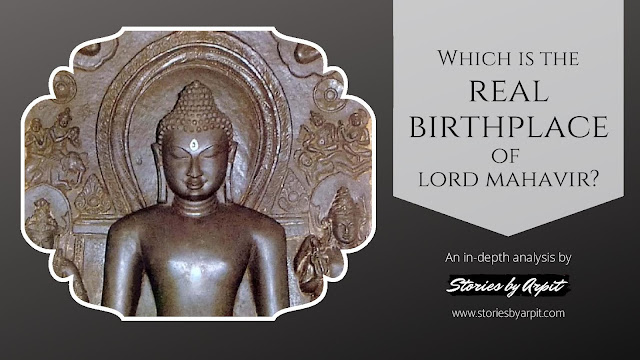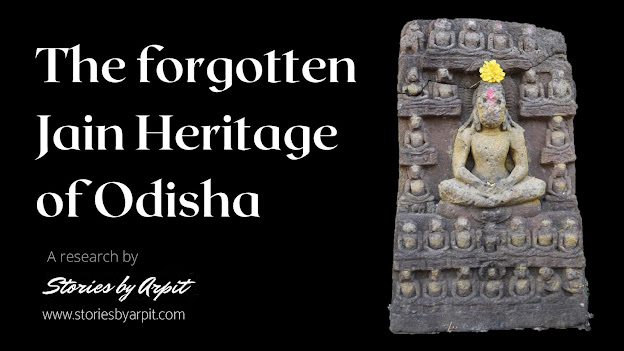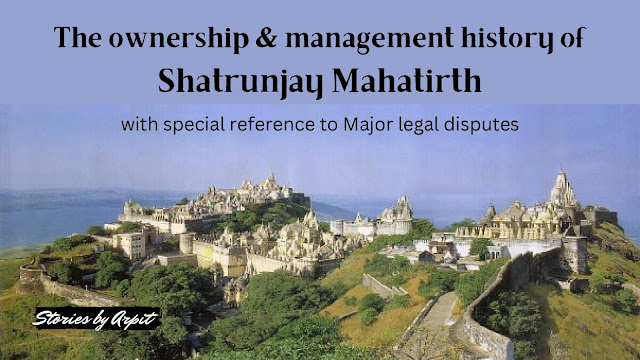The forgotten Jain heritage of Pakbirra and Purulia
Since ancient ages, the Purulia district of West Bengal has
been bestowed with the fortune of being extremely rich in heritage and culture. As mentioned in one of my previous blogs as
well, the “Acharang Sutra”, states that Lord Mahavir visited a
region known as Radh Pradesh shortly after Diksha, where he had
to face numerous calamities. Also, in the “Bhagwati Sutra” it has
been stated that Lord Mahavir spent many
‘Chaturmas’ in Panit Bhoomi, which is a portion of Radh
Pradesh. As per Encyclopedia Britannica, thr geographical & historical
indicators state that Radh Pradesh is a toponym for an area in the Indian
subcontinent that lies between the Chota Nagpur Plateau on the West and the
Ganges Delta on the East. Although the boundaries of the region have been
defined differently according to various sources throughout history, today it
is mainly coextensive with the state of West Bengal also comprising some
portions of the state of Jharkhand and Bihar in India.
 |
| Pakbirra Jain Temples |
Therefore, it is evident from the above facts that Lord
Mahavir blessed this region in the 6th century BC. Further, between the 8th
and 12th Centuries AD, many Jains, especially from northern and
central India started trading by transporting their ships to Bay of Bengal via
various rivers namely Damodar, Kangsabati, Dwarkeshvar, Subarnabaluka,
Shilavati which flow through this region. As their networks spread, these
traders evolved from mere trading to exporting various natural resources which
were mined from this mineral rich region.
 |
| Pakbirra Jain temple during excavation. Source: British Library |
As per historian and Assistant Professor Chintu Dutta, just
like other parts of Bengal, Purulia too faced the vicissitudes of time and yet
the people from this part responded lively to every cultural event. Jainism had
been one of those cultural events and quite interestingly the local people
of this region embraced Jainism first and still today they follow certain folk
rituals, the origin of which can be traced back to Jainism who are known as "Sarak's". Thus, as the
Jain influence spread a lot of Jain temples were constructed not only by
wealthy traders, but also local chieftains and ministers under the rule of
Anantavarman Chodaganga. Today, Jain idols, temples and ruins have been
found in hundreds of villages in the Purulia district which prove that Jainism
thrived in the ancient era. Some of them are as below -
Sankra/ Sankda – Ancient idols of Lord
Parshwanath and Lord Shantinath excavated and worshipped as Dharmaraj.
Anaijambad - Idols of Lord Adinath, Lord
Parshwanath and Chandraprabhu bearing the mark of Pala era excavated.
Sitalpur – Idol of Adinath Bhagwan
Chovisi excavated which is worshipped as Bhairavji. Bali (animal sacrifice) is
conducted in front of the idol on the Ashadh and Vaishakh Purnima
Bhangra – Chaumukhi idol of
Mahavir Swami, Lord Adinath and Chandraprabhu Swami excavated. One idol of Shri Adinath Bhagwan is pasted on the back wall of a Shiva temple and worshipped as Bhairav. Sadly, as the idol is kept in the open, local children have damaged parts of the parikar by using the idol as a 'wicket' for playing cricket.
 |
| Remains of a Jain idol pasted outside Digambar Shrine in Bhangra |
Sanka: Beautiful Chovisi idol of Shri Adinath Bhagwan currently protected by Shree Digambar Jain Tirth Sanrakshini Mahasabha. One Jain idol lying in ruins near the local pond whereas one idol of Shri Adinath Bhagwan has carvings of cloth (Katisutra).
Rakshatpur: An exceptionally beautiful idol of Shri Parshwanath Bhagwan with carvings of clothes (Katisutra) and a Tirthaankar idol preserved by Shree Digambar Jain Tirth Sanrakshini Mahasabha.
Barra: A badly damaged Sahastrakut (due to constant pasting of sindoor) and a Chaitya Chaturmukhi shrine is placed outside a Hindu temple.
Telkupi – 1200 year old ruins of Jain temple which was submerged deliberately under the newly constructed dam by Damodar Valley Corporation without allowing any scope for documentation or translocation. Telkupi was a major Jain settlement with temples and other artefacts dating back to the 9th century Pala period.
Gurudi: Idols recovered from Telkupi worshipped here in a shrine maintained by Shree Digambar Jain Tirth Sanrakshini Mahasabha. Idols of Shri Adinath along with Bharat & Bahubali worshipped here.
Lakhara – Idols of Lord Adinath
(Chovisi) and Lord Chandraprabhu (Panchtirthi) excavated from a field.
Dhadhki – Idols of Lord Adinath, Lord Shantinath
and Lord Mahavir Swami excavated, which are worshipped as Kaal Bhairav.
Lagara – 3 idols of Jain Tirthankars were
excavated and placed in the local Kali Temple. However, many antique idols
stolen in the past years from this region as well.
Barmasia – Idols of Lord Adinath,
Ajithnath, Chandraprabhu and various chovisis excavated.
Paruldiha – A 5ft tall idol of Lord
Adinath excavated from a villager’s house which is worshipped as Bhairav.
Bhasardanga – Chaumukhi idol excavated
from a field
 |
| Chaumukhji at Bhasardanga (Source: Bharat Bahubali TV) |
Tusiama – Idol of Lord Adinath excavated.
Manbazar –Idols of Lord Adinath and
Shantinath Bhagwan excavated
Polma – 7ft headless idol of an
(unidentified) Jain Tirthankar excavated along with idols of Lord Adinath &
Sambhavnath.
Paglara – Beautiful idol Parshwanath has
been excavated which is worshipped by the local villagers as Kaal Bhairav.
Despite requests by Jains, regular animal sacrifice conducted in front of the
idol.
Charrah – Ancient relics of Jain temple as well as multiple Jain idols excavated. An idol of Shri Adinath Bhagwan used as a "dwarpal" (gatekeeper) of a Kali Mata temple.
 |
| Idol of Shri Adinath Bhagwan used as a "dwarpal" (gatekeeper) of a Kali Mata temple |
 |
| Remains of an ancient Jain temple at Charrah |
 |
| Jain ruins at Charrah |
Golamara – Ancient 7 ft damaged idol of Lord
Mahavir without hands worshipped as Bhairav by locals.
Banda – Ruins of an Ancient Jain temple.
Para – 2 temples and an ancient idol of a
Tirthankar worshipped as Bhairav where a sacrificial altar has been newly
constructed for regular animal sacrifices.
Deulghata – Ruins of beautiful Jain
temples.
 |
| Deulghata Jain Temple (Source: Wikimedia Commons) |
While these ruins recount the glorious past of Jainism, one
such village in the Purulia district stands out –Pakbirra (See location here). Situated
around 50 kms from Purulia town on the Purulia-Pancha road, this village
houses a treasure trove for Jains. Pakbirra came into the limelight when a
plethora of antiquities related to Jains were discovered along with three
temples with unique shape dating back to the 9th & the 10th
Century AD. More than 100 years ago, Pakbirra was an open archeological
gallery, housing several temples and innumerable Jain statues. Today, after
utter neglect only three temples remain standing while several priceless
statues are turning into ruins.
 |
| The third and the smallest surviving Jain temple |
Mr. J.D. Beglar, one of the pioneer scholars of Indian
archaeology started to explore the place and what he found was quite amazing.
In 1872 when he started exploring the place, there were only 3 temples
remaining out of 24. The material used to construct these temples was greenish
chlorite stone, which is found in abundance in the area. All the temples are
built in ‘rekha deul' style of Odisha school of architecture. In first
temple, the entrance is built like a chariot with a corbelled entrance. The
second temple also faces north while the third faces east.
 |
| Locally known as the Bhairav Sthan |
These temples, buried several feet upto the level of the
wall niches, still have some of the lower façade stones, which give an idea of
their appearance. The have the basic tri-ratha plan with simplified squad of
moldings. The large amalaka fragments lying about, and the stone kalasha’s with
lotus buds emerging, make it obvious that most of the temples here belonged to
the usual nagara order.
 |
| 8 ft idol of Lord Shitalnath/ Padmaprabhu worshipped as Bhairavnath by locals |
The most significant excavation from Pakbirra was an 8 ft
high idol of Lord Shitalnath/ Padmaprabhu standing on a lotus flanked by
two celestials with fly-whisks. As the idol is now worshipped as Bhairavnath,
a Hindu celestial, the forehead and feet are full of oil and vermillion and a
trident placed next to him. Along with the large idol, an idol of
Adhishtayika devi was also found which has also been kept next to it. The local
population along with the local authorities and the State Government has named
this site as “Bhairav Sthan” and a Hindu temple is being constructed
where this idol will be worshipped as Bhairavnath. Very soon the
remaining traces of Jainism will be lost until the Archaeological survey of
India wakes up and takes corrective action. The locals bath here in the nearby
pond while the children play cricket creating further damage to this heritage site.
 |
| Temple construction on full swing |
 |
| Children playing cricket in the compound |
The smallest temple facing the east houses a beautiful idol
of Shri Chandraprabhu Swami with a Chovisi. Although the idol is not
damaged, its Parikar which houses the chovisi has been partially destroyed. The
other two temples facing the north, house 2 beautiful and undamaged idols of Lord
Adinath and Lord Mahavir each with a Parikar housing a chovisi. Another
idol of Lord Adinath with a Panchtirthi in its parikar is also housed in the
third temple.
 |
| Idol of Chandraprabhu Swami |
 |
| Idol of Lord Adinath |
 |
| Idol of Mahavir Swami |
Apart from these, many other idols of Tirthankar’s and
celestials were also unearthed, which have now been kept in a room which is
planned to be converted into a museum. The room houses multiple images of
Lord Adinath with different hair designs –see images below (Lord Adinath
is represented with locks of hairs as when the Lord was plucking his hairs before
Diksha, Indra dev requested him that they looked divine and not to pluck them).
 |
| 10 idols of Lord Adinath - all with different hair designs |
 |
| Idols of various Tirthankar's |
Another interesting relic discovered from the excavations
was a Sahastra-pat - a stone
plate housing 356 idols of Tirthankar’s with Lord Adinath seated in the middle.
Two damaged idols of Lord Parshwanath were also found with Dharnendra and
Padmavati carved on them. What is interesting that these idol designs,
structure and carvings have a strong resemblance with the idol of Mahavir Swami
at Kshatriyakund which provides an insight of the sculptural art over the
ancient era. (See image below)
 |
| Sahastra Pat |
 |
| Damaged idols of Lord Parshwanath with Dharnendra & Padmavati |
 |
| Design similarities |
While these ruins at Pakbirra are being looked after some members of the Jain community, we still have a far way to go to preserve our heritage. It has to be preserved soon, otherwise no trace of our roots will be left in this region.
 |
| Chaumukhi Pratimaji |
How to reach
Purulia is around 270 kms from Kolkata and is accessible by
Road, Train and Bus. By road, Purulia can be reached via NH 314 and SH 2 from
Kolkata. Regular trains like Howrah Chakradharpur Express and Rupasi Bangla ply
to and from Kolkata.
 |
| Shankeshwarpuram Jain Tirth |
Where to stay
Shankheshwarpuran Jain Tirth (SH5, Sankra, WB 723126. Click here for location),
constructed under the guidance of Acharya Muktiprabh Surishwarji Maharaja and
Acharya Vinitprabh Surishwarji (Mohansuri Samuday) is situated in Sankda
village near Anara Jn. which is 25km from Purulia and 52km from Pakbirra. The
complex houses 2 beautiful Jain temples and has lodging facilities along with a
Bhojanshala. However, prior intimation is important. Contact – 9932542001.
 |
| Idols of Adhishtayak Dev-Devi's |




































You are doing good work, bro.
ReplyDeleteLooking at your orientation, you may also like to visit Ahichhatra in UP, Gopachal Parvat, Gwalior Fort, MP and Mangi Tungi in Maharashtra.
If you are interested i can share many more. I am also into searching and doing jatra to many such odd locations.
Thank you! I would love to visit these places as well. Please send me the details at csarpitshah@gmail.com
DeleteAnumodna
ReplyDeleteBut still we have to do much for endangered heritage
Very very knowledgeable writing.
ReplyDeleteThanks
From kolkata about 25 f us are planning to visit Purulia as Jain Teerth.
ReplyDeleteCould you share your number and build us a road map to make it easier for us? We will be taking 25 seater bus and will also have elderly people with us.
Very very nice information
ReplyDeleteमैं इस जगह प्राक बिर्रा जा चुका हूं , बहुत ही सुन्दर जगह है परन्तु रख रखाव के अभाव से बहुत सारे पुराने महत्वपूर्ण मूर्तियों की दशा खराब है , सरकार को इस ओर ध्यान देना चाहिए
ReplyDeleteVery nice comprehensive information provided by you..Jain Community of purulia with the help of others should take note of it and it should make a trust to re-establish the Jain Temple with modern facilities
ReplyDeleteThank you Brother. You have described well about Pakbirra. I visited Pakbirra in last month and
ReplyDeleteI think this was the largest Jain centre in Kansai valley. You have mentioned the stone plate as "Sahastra Pat, in which miniatures of Tirthankaras are engraved in several lines around Adinath. Is it also called Ayagapatta?
Start fundraising so these can be renovated or bought
ReplyDeleteHi all this is very disheartening to see the state of our jain culture. Soon it will be lost . We jains donate so much of money
ReplyDeleteCan't we do something to save these temples at this place and elsewhere in india
Very nice job
ReplyDeleteThnx
ReplyDelete